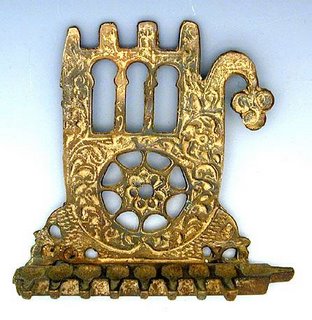 So, am heading north (racing the armadillos, from what I understand), for a few days away from the internet, away from furry creatures great and small so....
So, am heading north (racing the armadillos, from what I understand), for a few days away from the internet, away from furry creatures great and small so....Happy Holidays
Buon Natale
Joyeux Noel
Feliz Navidad
(fill in the blank yourself)
love y'all
Zazou
Happy Hannukah

(North African menorah)
Happy Hannukah to our dear Jewish friends and readers. May the joys of the season with you and yours. And may this be the year that together, with John Lennon, we can say: War is Over-if you want it to be.
Merry Christmas
 (Children lighting candles in the Church of the Nativity, Bethlehem)
(Children lighting candles in the Church of the Nativity, Bethlehem)Merry Christmas to our dear Christian friends and readers. May the joys of the season be with you and yours.
And may this be the year, that you and I can say, with John Lennon: War is Over- if you want it to be.
You say Apartheid, I say containment...
Lo these many years, a peanut farmer climbed onto the National Stage, and got wacked by Reagan's posse.
And then, the not quite as simple as he seemed farmer, stepped on to the International Stage and did credit to himself and to his nation, which is more than I can say for a number of presidents past and present.
Carter's new book, Palestine: Peace Not Apartheid is roiling the ranks in a healthy (more or less) turmoil. I haven't read the book yet, I'm still trying to finish my review of Zighn's Still Moments (hard to get these things right, sometimes) and reading The Yacoubian Building, so I really won't and can't comment on the contents. I do, however, find a current situation rather interesting.
The San Diego Union Tribune- not known for a conscious libral thought, although occasionally the Editorial Board hiccups and something profoundly decent surfaces (for which I imagine they don hairshirts and flagellate themselves profusely). Their latest foray into non-Iraqi ME commentary was the following:
As I said, I haven't read the book itself, but having written on, been involved in, dealt with Israeli/Palestinian issues off and on for years, I'd say the editorial writer a) didn't read the book either and b)is a sorry excuse for a journalist
But I'll leave the real commentary on the commentary to the letters to the editor section. It's very interesting. Check it out.
Love the use of the word "calumy." It's always nice to broaden one's vocabulary and then road test it.
And then, the not quite as simple as he seemed farmer, stepped on to the International Stage and did credit to himself and to his nation, which is more than I can say for a number of presidents past and present.
Carter's new book, Palestine: Peace Not Apartheid is roiling the ranks in a healthy (more or less) turmoil. I haven't read the book yet, I'm still trying to finish my review of Zighn's Still Moments (hard to get these things right, sometimes) and reading The Yacoubian Building, so I really won't and can't comment on the contents. I do, however, find a current situation rather interesting.
The San Diego Union Tribune- not known for a conscious libral thought, although occasionally the Editorial Board hiccups and something profoundly decent surfaces (for which I imagine they don hairshirts and flagellate themselves profusely). Their latest foray into non-Iraqi ME commentary was the following:
Carter's Calumy/Deceptive book on Palestine rewrites history
UNION-TRIBUNE
December 16, 2006
Jimmy Carter has spent years burnishing his reputation as “America's greatest ex-president.” Now, with the publication of his book, “Palestine: Peace Not Apartheid” – which likens Israel to the former racist regime in South Africa – Carter has put all that in jeopardy.
No one questions that Israel has a long and checkered history in its dealings with the Palestinians. But in recent years, Israel has made many overtures and concessions only to find itself without a willing partner for peace. Even many of the Palestinian Authority's once-ardent European supporters now agree that it is a corrupt sham.
Given this history, it is simply stunning that Carter could put out a book with this succinct thesis: It's all the Jews' fault.
He ignores that the current and previous Israeli prime ministers have worked to reverse past decisions to permit settlements on Palestinian land – which is his main grievance against Israel. He pretends the goal of Israel's security fence is not to stop murderous suicide bombers but to “imprison” Palestinians. Against the testimony of President Bill Clinton and all available evidence, he absolves Yasser Arafat for the collapse of the very promising 2000 Camp David talks – indeed, he still holds out Arafat as a heroic figure.
All this is bad enough. But Carter also finds common ground with the anti-Semitic groups who insist Israel's monstrous ways are ignored by Congress and the media because they are manipulated by American Jews more sympathetic to Israel than the United States.
This is destructive nonsense. The good news is that the overwhelming reaction to his book reflects the recognition that it consists of destructive nonsense.
The bad news is that Carter's prominence ensures his fact-deprived analysis will pollute policy debates for years to come. Yet he offers himself up as a statesman. That's amazing – and sad.
As I said, I haven't read the book itself, but having written on, been involved in, dealt with Israeli/Palestinian issues off and on for years, I'd say the editorial writer a) didn't read the book either and b)is a sorry excuse for a journalist
But I'll leave the real commentary on the commentary to the letters to the editor section. It's very interesting. Check it out.
Love the use of the word "calumy." It's always nice to broaden one's vocabulary and then road test it.
Newsflash...
Thomas Friedman is having a public snit fit. Apparently reporting from the Middle East (or writing near it) is getting harder, Thomas appears no longer to be the fair-haired western writer and now, he is having a very public, very East Coast inteligentsia snit fit. Which means the rhetoric is very controlled, very reasonable sounding and requires a closer reading, and then a shower, because there is an underlying sleaziness of a jilted lover on the backsteps about it.
For Friedman, it seems the world is a truly flat place. For fun, check out the comments at The Arabist.
For Friedman, it seems the world is a truly flat place. For fun, check out the comments at The Arabist.
15 RULES FOR UNDERSTANDING THE MIDDLE EAST
BYLINE: By THOMAS FRIEDMAN
SECTION: MAIN; Pg. A15
LENGTH: 763 words
For a long time, I let my hopes for a decent outcome in Iraq triumph over what I had learned reporting from Lebanon during its civil war. Those hopes vanished last summer. So, I’d like to offer President Bush my updated rules of Middle East reporting, which also apply to diplomacy, in hopes they’ll help him figure out what to do next in Iraq.
Rule 1: What people tell you in private in the Middle East is irrelevant. All that matters is what they will defend in public in their own language. Anything said to you in English, in private, doesn’t count. In Washington, officials lie in public and tell the truth off the record. In the Mideast, officials say what they really believe in public and tell you what you want to hear in private.
Rule 2: Any reporter or U.S. Army officer wanting to serve in Iraq should have to take a test, consisting of one question: “Do you think the shortest distance between two points is a straight line?” If you answer yes, you can’t go to Iraq. You can serve in Japan, Korea or Germany - not Iraq.
Rule 3: If you can’t explain something to Middle Easterners with a conspiracy theory, then don’t try to explain it at all - they won’t believe it.
Rule 4: In the Middle East, never take a concession, except out of the mouth of the person doing the conceding. If I had a dollar for every time someone agreed to recognize Israel on behalf of Yasser Arafat, I could paper my walls.
Rule 5: Never lead your story out of Lebanon, Gaza or Iraq with a cease-fire; it will always be over before the next morning’s paper.
Rule 6: In the Middle East, the extremists go all the way, and the moderates tend to just go away.
Rule 7: The most oft-used expression by moderate Arab pols is: “We were just about to stand up to the bad guys when you stupid Americans did that stupid thing. Had you stupid Americans not done that stupid thing, we would have stood up, but now it’s too late. It’s all your fault for being so stupid.”
Rule 8: Civil wars in the Arab world are rarely about ideas - like liberalism vs. communism. They are about which tribe gets to rule. So, yes, Iraq is having a civil war as we once did. But there is no Abe Lincoln in this war. It’s the South vs. the South.
Rule 9: In Middle East tribal politics there is rarely a happy medium. When one side is weak, it will tell you, “I’m weak, how can I compromise?” And when it’s strong, it will tell you, “I’m strong, why should I compromise?”
Rule 10: Mideast civil wars end in one of three ways: a) like the U.S. civil war, with one side vanquishing the other; b) like the Cyprus civil war, with a hard partition and a wall dividing the parties; or c) like the Lebanon civil war, with a soft partition under an iron fist (Syria) that keeps everyone in line. Saddam used to be the iron fist in Iraq. Now it is us. If we don’t want to play that role, Iraq’s civil war will end with A or B.
Rule 11: The most underestimated emotion in Arab politics is humiliation. The Israeli-Arab conflict, for instance, is not just about borders. Israel’s mere existence is a daily humiliation to Muslims, who can’t understand how, if they have the superior religion, Israel can be so powerful. Al Jazeera’s editor, Ahmed Sheikh, said it best when he recently told the Swiss weekly Die Weltwoche: “It gnaws at the people in the Middle East that such a small country as Israel, with only about 7 million inhabitants, can defeat the Arab nation with its 350 million. That hurts our collective ego. The Palestinian problem is in the genes of every
Arab. The West’s problem is that it does not understand this.”
Rule 12: Thus, the Israelis will always win, and the Palestinians will always make sure they never enjoy it. Everything else is just commentary.
Rule 13: Our first priority is democracy, but the Arabs’ first priority is “justice.” The oft-warring Arab tribes are all wounded souls, who really have been hurt by colonial powers, by Jewish settlements on Palestinian land, by Arab kings and dictators, and, most of all, by each other in endless tribal wars. For Iraq’s long-abused Shiite majority, democracy is first and foremost a vehicle to get justice. Ditto the Kurds. For the minority Sunnis, democracy in Iraq is a vehicle of injustice. For us, democracy is all about protecting minority rights. For them, democracy is first about consolidating majority rights and getting justice.
Rule 14: The Lebanese historian Kamal Salibi had it right: “Great powers should never get involved in the politics of small tribes.”
Rule 15: Whether it is Arab-Israeli peace or democracy in Iraq, you can’t want it more than they do.
"We Cannot Lose"


Claudia Fernety
(these are two panels that go together- I can't seem to get them next to each other *sigh*)
The fallout over the Baker report on Iraq (ok, the Iraq Study Group, but it's still Baker's baby) is still sprinkling down, slowed a bit by the usual holiday distractions. It seems that Bush has decided to cherrypick from the report in a father interesting way- he will "consider" certain aspects only to eventually refuse them.
Prevailing winds from the Right fear the underlying message of the report is that we should just get out while the going is good, hence the we should not lose, etc. message.
But, as Tariq Ali and others have already observed, we have "lost," depending on what your definition of lost is. If the definition of the whole exercise was to foster a democracy in a Middle Eastern country- then, we lost from the get go. It was a poorly conceived exercise drafted by people drunk on hubris and short on actual information. They relied on Chalabi and his hangers on, business, not democracy, was the secret watchword, and the kingmakers have had fun running their strawmen around on the board.
We have lost because our military has become a crass, crude, and sometimes predatory occupying force. So desperate is the military for bodies that members of the Arayan brotherhood are reported to have infiltrated the ranks for small arms training. At Pendleton, we will soon be watching the ultimate degradation of the honorable American soldier image as the details of the Haditha massacre are discussed and the defendents turn state's evidence in one last desperate bid to save their skins, appointing one person to twist in the wind for a group crime. The bad apple theory is alive and well, which is more than one can say for the 25+ people (civilians, btw) slaughtered in Haditha.
But, "we" (a very loose usage of) haven't "lost" if the idea is to make American society a slowly crumbling edifice to be rebuilt along neoCon lines in a bastardized image of Reagan's shining City on the Hill. It will soon be morning in Reagan's America with the hummer in the driveway, Fox news chortling in the background.
We haven't "lost" if the idea is to really destabilize the Middle East, dash around on "diplomatic missions" and gather the spoils unto ourselves. The only problem is, the place is not fully cooperating. Rants like Thomas Friedman's last peevish list don't help, and come the day after Christmas, I'm pretty sure the Middle East is a f-g mess rhetoric will rachet up.
So, "losing" is relative, in that sense.
Me, personally, I think we lost and lost it shortly after the invasion. I don't know why it took so much money and so much time to state the obvious.
Odd but true...North with the Armadillos
Had a very interesting talk yeaterday with some friends...apparently it is warming up so much, the armadillos are leaving Texas and heading north.
The Penn that roared
Sean Penn has has some very interesting things to say recently. Take this speech, for example, before the Creative Coalition on Monday:
The mixing of the profane with the unerring call to national and cultural accountability is very interesting. Penn is often maligned by the Right as a Hollywood do-gooder, in terms of the war, but Penn has been right on since the beginning- and I think hs is right on again as he calls for the people to bring the government to account. He is also right about the positioning of TV programming and films to bring about positive change(favorable towards a position)- athough this is nothing new. Currently, The Force, for example, is a romanticized look at secret ops forces with the right blend of macho force, solemn responsibility, wives who stand by their man, blah, blah, blah. More subtle and more entertaining (to my mind) is Casablanca- which is again a romanticized notion of a place and time but which was made to prick American conscience and get it to support action in WWII in the European Theatre.
Again, Hollywood- or at least some of it, is starting to beat to a more conscious drum. yes,I know, they wax and wane, first aware, then hyper consumer chic. It is nice to see Penn developing into an actor of conscience, since, if Robert Novak was right when he told a group of interns (of which I was one), that Reagan saw politics as one big sound stage and himself, the eternal and constant actor (no Richard Burton, he), there are precious few, if any, on the national stage.
It is we the people who need to bring down the curtian.
They tell us we lost 3,000 Americans on 9/11. Is that enough? We're about to match it. We're within weeks, if not less, of killing 3,000 Americans in Iraq. I ask Speaker Pelosi, can we put impeachment on the table then? Without former FEMA chief Mike Brown being held accountable, post Katrina (scapegoat though he may have been) we'd have had the same chaos and neglect when Rita hit Houston. Think about it. And, the same people who trumpet deterrence as a justification for punishment when we speak of "crime and punishment," will boast their positive thinking when dismissing the deterrent qualities of an impeachment proceeding.(read the rest)
The mixing of the profane with the unerring call to national and cultural accountability is very interesting. Penn is often maligned by the Right as a Hollywood do-gooder, in terms of the war, but Penn has been right on since the beginning- and I think hs is right on again as he calls for the people to bring the government to account. He is also right about the positioning of TV programming and films to bring about positive change(favorable towards a position)- athough this is nothing new. Currently, The Force, for example, is a romanticized look at secret ops forces with the right blend of macho force, solemn responsibility, wives who stand by their man, blah, blah, blah. More subtle and more entertaining (to my mind) is Casablanca- which is again a romanticized notion of a place and time but which was made to prick American conscience and get it to support action in WWII in the European Theatre.
Again, Hollywood- or at least some of it, is starting to beat to a more conscious drum. yes,I know, they wax and wane, first aware, then hyper consumer chic. It is nice to see Penn developing into an actor of conscience, since, if Robert Novak was right when he told a group of interns (of which I was one), that Reagan saw politics as one big sound stage and himself, the eternal and constant actor (no Richard Burton, he), there are precious few, if any, on the national stage.
It is we the people who need to bring down the curtian.


